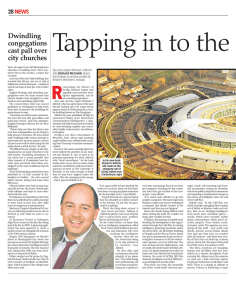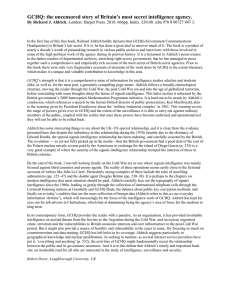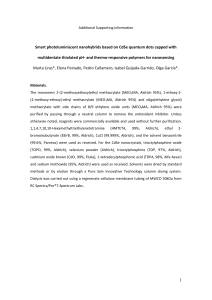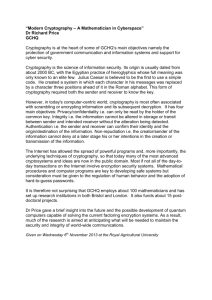Tapping in to the secrets of GCHQ NEWS 29
advertisement
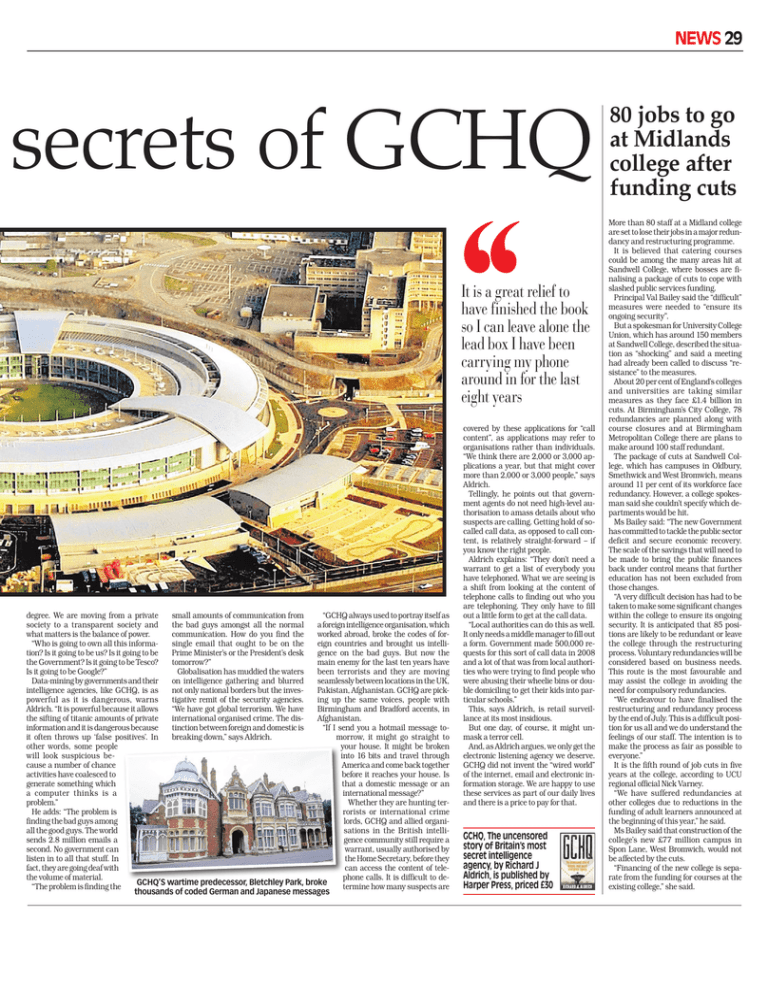
NEWS 29 secrets of GCHQ ‘ It is a great relief to have finished the book so I can leave alone the lead box I have been carrying my phone around in for the last eight years “GCHQ always used to portray itself as small amounts of communication from degree. We are moving from a private a foreign intelligence organisation, which the bad guys amongst all the normal society to a transparent society and worked abroad, broke the codes of forcommunication. How do you find the what matters is the balance of power. eign countries and brought us intellisingle email that ought to be on the “Who is going to own all this informagence on the bad guys. But now the Prime Minister’s or the President’s desk tion? Is it going to be us? Is it going to be main enemy for the last ten years have tomorrow?” the Government? Is it going to be Tesco? been terrorists and they are moving Globalisation has muddied the waters Is it going to be Google?” seamlessly between locations in the UK, on intelligence gathering and blurred Data-mining by governments and their Pakistan, Afghanistan. GCHQ are picknot only national borders but the invesintelligence agencies, like GCHQ, is as ing up the same voices, people with tigative remit of the security agencies. powerful as it is dangerous, warns Birmingham and Bradford accents, in “We have got global terrorism. We have Aldrich. “It is powerful because it allows Afghanistan. international organised crime. The disthe sifting of titanic amounts of private “If I send you a hotmail message totinction between foreign and domestic is information and it is dangerous because morrow, it might go straight to breaking down,” says Aldrich. it often throws up ‘false positives’. In your house. It might be broken other words, some people into 16 bits and travel through will look suspicious beAmerica and come back together cause a number of chance before it reaches your house. Is activities have coalesced to that a domestic message or an generate something which international message?” a computer thinks is a Whether they are hunting terproblem.” rorists or international crime He adds: “The problem is lords, GCHQ and allied organifinding the bad guys among sations in the British intelliall the good guys. The world gence community still require a sends 2.8 million emails a warrant, usually authorised by second. No government can the Home Secretary, before they listen in to all that stuff. In can access the content of telefact, they are going deaf with phone calls. It is difficult to dethe volume of material. GCHQ’S wartime predecessor, Bletchley Park, broke termine how many suspects are “The problem is finding the thousands of coded German and Japanese messages covered by these applications for “call content”, as applications may refer to organisations rather than individuals. “We think there are 2,000 or 3,000 applications a year, but that might cover more than 2,000 or 3,000 people,” says Aldrich. Tellingly, he points out that government agents do not need high-level authorisation to amass details about who suspects are calling. Getting hold of socalled call data, as opposed to call content, is relatively straight-forward – if you know the right people. Aldrich explains: “They don’t need a warrant to get a list of everybody you have telephoned. What we are seeing is a shift from looking at the content of telephone calls to finding out who you are telephoning. They only have to fill out a little form to get at the call data. “Local authorities can do this as well. It only needs a middle manager to fill out a form. Government made 500,000 requests for this sort of call data in 2008 and a lot of that was from local authorities who were trying to find people who were abusing their wheelie bins or double domiciling to get their kids into particular schools.” This, says Aldrich, is retail surveillance at its most insidious. But one day, of course, it might unmask a terror cell. And, as Aldrich argues, we only get the electronic listening agency we deserve. GCHQ did not invent the “wired world” of the internet, email and electronic information storage. We are happy to use these services as part of our daily lives and there is a price to pay for that. GCHQ, The uncensored story of Britain’s most secret intelligence agency, by Richard J Aldrich, is published by Harper Press, priced £30 80 jobs to go at Midlands college after funding cuts More than 80 staff at a Midland college are set to lose their jobs in a major redundancy and restructuring programme. It is believed that catering courses could be among the many areas hit at Sandwell College, where bosses are finalising a package of cuts to cope with slashed public services funding. Principal Val Bailey said the “difficult” measures were needed to “ensure its ongoing security”. But a spokesman for University College Union, which has around 150 members at Sandwell College, described the situation as “shocking” and said a meeting had already been called to discuss “resistance” to the measures. About 20 per cent of England’s colleges and universities are taking similar measures as they face £1.4 billion in cuts. At Birmingham’s City College, 78 redundancies are planned along with course closures and at Birmingham Metropolitan College there are plans to make around 100 staff redundant. The package of cuts at Sandwell College, which has campuses in Oldbury, Smethwick and West Bromwich, means around 11 per cent of its workforce face redundancy. However, a college spokesman said she couldn’t specify which departments would be hit. Ms Bailey said: “The new Government has committed to tackle the public sector deficit and secure economic recovery. The scale of the savings that will need to be made to bring the public finances back under control means that further education has not been excluded from those changes. “A very difficult decision has had to be taken to make some significant changes within the college to ensure its ongoing security. It is anticipated that 85 positions are likely to be redundant or leave the college through the restructuring process. Voluntary redundancies will be considered based on business needs. This route is the most favourable and may assist the college in avoiding the need for compulsory redundancies. “We endeavour to have finalised the restructuring and redundancy process by the end of July. This is a difficult position for us all and we do understand the feelings of our staff. The intention is to make the process as fair as possible to everyone.” It is the fifth round of job cuts in five years at the college, according to UCU regional official Nick Varney. “We have suffered redundancies at other colleges due to reductions in the funding of adult learners announced at the beginning of this year,” he said. Ms Bailey said that construction of the college’s new £77 million campus in Spon Lane, West Bromwich, would not be affected by the cuts. “Financing of the new college is separate from the funding for courses at the existing college,” she said.
